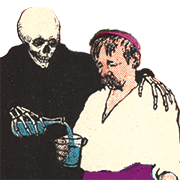|
Absurd Alhazred posted:Does the world need that, though? Edit: Now that I think about it, "better rules for cartoon fight scenes" is pretty low on my RPG priorities. I'm just in a holding pattern until the Pendragon starter set comes out. Siivola fucked around with this message at 07:06 on Mar 11, 2022 |
|
|
|

|
| # ? May 25, 2024 09:54 |
|
Absurd Alhazred posted:Does the world need that, though? Yes, and it needs to be heavily anime themed.
|
|
|
|
Question: does Strike not qualify for that? I started playing it recently, and I've found it fun.
|
|
|
|
Not really, Strike is a lot of fun but has way lower tactical depth.
|
|
|
|
Plutonis posted:Not really, Strike is a lot of fun but has way lower tactical depth. I'm curious what you're seeing there. Strike has for the most part all the same stuff as 4e. The rules for flanking, disengaging, etc. are all basically the same. The rules for cover are more reliable and thus more tactically useful. I kept all the forced movement and stuff that made 4e combat dynamic and made positioning matter. All the to-hit math and damage expectations were just reverse-engineered out of 4e. Notably missing in Strike is damage types - but my feeling was that 4e had a lot of encounter powers that were just like "you do big damage and it's necrotic". Whereas Strike powers all do cool stuff, which I think increases tactical depth. I also tried to put in some limitations against alpha-striking in some places (honestly, I think I should have had more), because dropping all your best poo poo in round 1 was pretty dominant and brainless in 4e. Strike does have some builds where there is a clear best at-will that you use every turn, but 4e has those, too. In my work on Strike 2e, I'm trying to figure out ways to avoid that, but it's not easy. I ask not because I want argue, but because I am working on 2e now and I'd really like to know where I've lost some tactical depth and might put it back in, if I can without busting the math.
|
|
|
|
I'll need to take another look at it I guess, I only ever looked at strike when it was in its earliest stages.
|
|
|
|
Has anyone ever made/seen a dungeon generator app that spits out useable, keyed PDFs? I thought it would be a fun zinequest-type project - every backer could get a wholly unique dungeon in nice printed form, plus access to the generator itself. Feels unlikely that I'm the first person to come up with this, though.
|
|
|
|
 Oh cool, this airbnb has a load of vintage gamebooks, I wonder what kind of --  oh no
|
|
|
|
tee hee concealing crack "Hikes target's pants up as far as they can possibly go"
|
|
|
|
PurpleXVI posted:https://writeups.letsyouandhimfight.com/purplexvi/dragonlance/ I had a pile of Dragonlance books as a kid and loved the PC games, so this is a great read, thanks. I never actually got to play the modules and apparently I'm not missing much. I reread the Chronicles recently and I'm baffled why I was so obsessed with it.
|
|
|
|
BinaryDoubts posted:Has anyone ever made/seen a dungeon generator app that spits out useable, keyed PDFs? I thought it would be a fun zinequest-type project - every backer could get a wholly unique dungeon in nice printed form, plus access to the generator itself. Feels unlikely that I'm the first person to come up with this, though. Donjon's random dungeon generator does this, though the PDF formatting isn't great (and it pulls some content from d20, Pathfinder, 5e, etc. SRDs under an OGL, so you'll either need to scrub that or include the relevant OGL in your work). Watabou's one-page dungeon generator works too if you can use PNG or SVG files in your PDFs, but it doesn't fully populate the dungeon, just adds a handful of interesting objects.
|
|
|
|
JMBosch posted:Donjon's random dungeon generator does this, though the PDF formatting isn't great (and it pulls some content from d20, Pathfinder, 5e, etc. SRDs under an OGL, so you'll either need to scrub that or include the relevant OGL in your work). Watabou's one-page dungeon generator works too if you can use PNG or SVG files in your PDFs, but it doesn't fully populate the dungeon, just adds a handful of interesting objects. Thanks for the links, good to see the prior art. Might still take a run at this and see if I can improve (or at least offer a different take) on the existing stuff.
|
|
|
|
I wonder if there’s an intrinsic problem with tactics as a goal, since most actual tactics are also pretty much solved. And if you move a game away from the “set piece battles with story rails in between” l, the more likely that battles will take place in locations where no tactician would fight or there’s an obvious solution. “Can we bomb it? Can we siege it? Can we snipe it? Can we kite it?” covers a lot of scripted encounters in badly written adventures and even more impromptu ones. The question is how to get the “realer” feeling of a precisely defined system without that.
|
|
|
|
hyphz posted:I wonder if there’s an intrinsic problem with tactics as a goal, since most actual tactics are also pretty much solved. And if you move a game away from the “set piece battles with story rails in between” l, the more likely that battles will take place in locations where no tactician would fight or there’s an obvious solution. “Can we bomb it? Can we siege it? Can we snipe it? Can we kite it?” covers a lot of scripted encounters in badly written adventures and even more impromptu ones. Well two things I think a lot of tactical wargames remain very open ended and unsolved, so the design space for interesting tactical combat absolutely exists. Infinity is a great example if you want something crunchy. As for that second part...I mean, I don't fully disagree. A campaign as a series of tactical battles with rails in between is I think fine, but if there's anything I learned from doing hot-seat MP campaigns of Rome: Total War, is that for a given campaign you should stick to one "layer" as the one people actually care about. Zooming between strategic and tactical fights is mostly frustrating and annoying. If you want to have a strategic level campaign be where people focus the attention, it's best for multiple reasons to just elide tactical fights. e: tbh I think that elision serves the "realer" feeling - generals are not sergeants
|
|
|
|
What do you mean by tactics being solved? And maybe there needs to be a better space for strategy as a backing for getting into a tactical encounter, like "okay this is a terrible situation, let's not get here" or "well, this sucks, but we've already committed resources so we need to make the best of a bad situation".
|
|
|
|
Absurd Alhazred posted:What do you mean by tactics being solved? that last one is part of how tactical gameplay tends to come up in Endless Legend. Which TBH is not a game known for the tactical layer being good, but generally the reason to play out a tactical fight is when you got screwed by an ambush and want to preserve forces or inflict casualties in a way that the autoresolve would bias against.
|
|
|
|
Tulip posted:that last one is part of how tactical gameplay tends to come up in Endless Legend. Which TBH is not a game known for the tactical layer being good, but generally the reason to play out a tactical fight is when you got screwed by an ambush and want to preserve forces or inflict casualties in a way that the autoresolve would bias against. Yeah, I think I agree with your above post that it may be better to just turn that into a die roll if you want to focus on a layer above. Somewhere there's a video about Sid Meier initially planning to have tactical combat in Civilization and then deciding it was just going to take focus away from the strategy and exploration.
|
|
|
|
Humbug Scoolbus posted:Shadowfist adapted to run a Feng Shui game could be awesome The conversation has moved on, but one thing I never got around to doing was dealing a hand or two out of a Shadowfist deck and using that to construct a Feng Shui adventure.
|
|
|
|
Tulip posted:that last one is part of how tactical gameplay tends to come up in Endless Legend. Which TBH is not a game known for the tactical layer being good, but generally the reason to play out a tactical fight is when you got screwed by an ambush and want to preserve forces or inflict casualties in a way that the autoresolve would bias against. If tactics are "solved" for a game, then that game is usually poorly balanced and needs rebalancing, or has poor variety of encounters/arenas.
|
|
|
|
Absurd Alhazred posted:What do you mean by tactics being solved? If you think about historicals, in every battle that historical wargamers study or replay because of the interesting tactics involved, they turn out to be because of fairly specific arrangements of terrain or events or force dispositions. In practice for every one of those there were likely multiple engagements that were just stomps by one side or the other. And for every one of those there were probably hundreds of times when a generals worked out in advance that rote tactics would win the battle for one or another side and therefore didn't attack/defend that area so the potential battle never happened. Plus, many of those "interesting" tactical battles involved attrition on both sides which doesn't go down well with RPGs. A battle where a key artillery support was interdicted and a force had to deal with that translates into an RPG as one where Bob's wizard got downed by a bad roll in round 1 and everyone else had to tactically adapt to it while Bob sat staring into space for 2 hours. Basically if you can pick and choose your battles, and the stakes are high, you don't want tactics to matter. And that's a problem because in RPGs both of those are generally the case. Non-historical wargamers usually deliberately try to engineer interesting battles or "forget about" certain things but that makes sense for them because the scope is usually just a single battle - if it's a series in an overall campaign, they don't do that any more.
|
|
|
|
There's a larp I played which gets around this problem with the premise that the players' civilisation builds its military strategy around a superweapon they own: a portal that lets them teleport a strike team to the one battle in the military campaign where, due to the kind of unusual terrain or events or force dispositions Hyphz describes, the individual tactics of the battle fought have the potential to turn the tide of the war. I always thought that was a neat solution to wanting to have a game about individual battlefield tactics and grand strategy at the same time.
|
|
|
|
The thing is, faithful historical recreation is only one half of the picture: the other half is a game. When people fight real wars, they are not (shouldn't be) playing games, so if they have a series of "boring" engagements in which they win repeatedly due to superior forces, more resources, better doctrine, whatever - that's good for them. But we gamify things in a way that injects interesting choices into the deal. In fact, and we've discussed this before in the philosophy of games thread - I'd argue that the essential ingredient of every game that makes it "a game" is that there are interesting choices. An interesting choice is one that isn't a foregone conclusion, or for which there is not necessarily a single, optimal choice (or you cannot calculate the optimal choice, which amounts to the same thing in experience). Chess only has six different pieces, but it remains "unsolved." If you like, you can think of converting a historical battle (or the conditions of historical battles) into something more approximating a chess game, where the opponent's choices aren't perfectly predictable, and where your own choices take their choices as inputs and vise-versa. You can multiply the factors that make the choices interesting by adding in additional types of pieces, unpredictable or varying boards (terrain), differing objectives (checkmate your opponent's king doesn't have to be the only objective), etc. This is why I agree wholeheartedly with PurpleXVI posted:If tactics are "solved" for a game, then that game is usually poorly balanced and needs rebalancing, or has poor variety of encounters/arenas. It is really not that hard to make a good game, if you keep all the factors very simple. You probably won't invent the next Go or Chess, but you can make a very simple board, make one or two or three kinds of pieces, give them simple rules, and set a singular victory condition, and you are halfway to making a good game: play it a bit and you may want to creatively modify the rules, etc. but you'll likely wind up with a game that at least isn't trivially solvable, and at best, can have lots of depth. Where we get into deep trouble with RPGs and even with tabletop wargames is injecting so much complexity that balancing the game without playing it thousands of times is impossible. But by the same token, with sufficiently many different interactions possible, at least there's likely to still be lots of interesting choices, and if there's an obvious "solution" to the game, that is likely to emerge quickly through sufficient beta testing that you can make some rules changes to adjust the game so it remains interesting to play.
|
|
|
|
Leperflesh posted:The thing is, faithful historical recreation is only one half of the picture: the other half is a game. When people fight real wars, they are not (shouldn't be) playing games, so if they have a series of "boring" engagements in which they win repeatedly due to superior forces, more resources, better doctrine, whatever - that's good for them. But we gamify things in a way that injects interesting choices into the deal..... Chess only has six different pieces, but it remains "unsolved." And this is where the "roll-initiative border" in RPGs between tactical and non-tactical play becomes a bit tricky. Chess has only one starting condition which is known interesting, and wargamers set up situations which will create interesting battles. But in an RPG, unless the specific tactical set-piece is romeroaded (and in many RPGs of course it is), there's relatively little motivation for the PCs to try to arrange their encounters to happen in interesting ways, and even if the players do want to do this, it becomes a bit unnatural for the characters to be choosing to do that.
|
|
|
|
hyphz posted:And this is where the "roll-initiative border" in RPGs between tactical and non-tactical play becomes a bit tricky. Chess has only one starting condition which is known interesting, and wargamers set up situations which will create interesting battles. But in an RPG, unless the specific tactical set-piece is romeroaded (and in many RPGs of course it is), there's relatively little motivation for the PCs to try to arrange their encounters to happen in interesting ways, and even if the players do want to do this, it becomes a bit unnatural for the characters to be choosing to do that. Why would the players need to specifically arrange the encounters to happen in interesting ways when that is generally the GM's job? Like, what else would I do as a GM other than try to keep stuff interesting and exciting for the players? Andrast fucked around with this message at 05:44 on Mar 14, 2022 |
|
|
|
hyphz posted:Basically if you can pick and choose your battles, and the stakes are high, you don't want tactics to matter. And that's a problem because in RPGs both of those are generally the case. Edit: I guess Apocalypse World counts, because you can zoom in and out with moves as much as you like so you can solve a whole battle with a single pivotal Seize by Force or whatever.
|
|
|
|
Siivola posted:This is an interesting point and hyphz is correct, there's no reason to run every fight through the combat engine. OSR games talk the talk about sneaking around fights and everything, but I don't think there are games around that are designed to let the players do recon and only fight the battles they can stomp at. Burning Wheel does this with like 8 different subsystems and levels of granularity. (I'm not even that much of a Burning Wheel fan, but it's independently been relevant in like 3/4th of my posts here for some reason.)
|
|
|
|
Xiahou Dun posted:Burning Wheel does this with like 8 different subsystems and levels of granularity. I own both Burning Wheel Gold and Torchbearer 1E, I should try to finally learn them and see if I've had my Grail Game sitting unloved on my shelf for ten years.
|
|
|
|
I've played plenty of D&D where an "encounter" of sufficiently low CR that it'd be trivial simply isn't run as a combat encounter. Unless there's something to this encounter that will use up PC resources or determine one of multiple possible outcomes, it's pointless waste of time to make the players play it out instead of just stating the foregone conclusion, perhaps with some colorful description. Similarly, they don't earn XP for trivial tasks, including trivially defeating a group of enemies that would be a CR five levels below the party level. I don't remember if any editions actually tell you to do this, and it wasn't super common because typically GMs are trying to challenge the players, but it came up from time to time. e. Like, I recall one time we went back to a location we'd been to before, after having leveled up a bunch. There was not a point to having us play out a fight with some kobolds, so we didn't. The GM narrated them fighting a bit and then surrendering. Leperflesh fucked around with this message at 20:17 on Mar 14, 2022 |
|
|
|
Leperflesh posted:I've played plenty of D&D where an "encounter" of sufficiently low CR that it'd be trivial simply isn't run as a combat encounter. Unless there's something to this encounter that will use up PC resources or determine one of multiple possible outcomes, it's pointless waste of time to make the players play it out instead of just stating the foregone conclusion, perhaps with some colorful description. Similarly, they don't earn XP for trivial tasks, including trivially defeating a group of enemies that would be a CR five levels below the party level. As always comes up, 4e did this via monsters turning into minions and then eventually getting so low that they fall off the range of encounter math entirely, with some sidebar style mentions of turning swarms of dudes into a fluff for dangerous/difficult terrain at sufficiently high levels. Grogs got mad about this because it was new and different and scary so it got taken out of 5e.
|
|
|
|
Siivola posted:I don't think there are games around that are designed to let the players do recon and only fight the battles they can stomp at. Gunning your enemy down in a 7-Eleven parking lot when he leaves the fortified cult compound to buy cigarettes is not going to satisfy players who want balanced tactical combat with miniatures and maps. The satisfaction is in the characters outsmarting a deadly foe, who could have easily done the same thing to them if they had misplayed the situation.
|
|
|
|
Yes, hyphz is wrong in the sense that if someone is looking for a tactical miniatures wargame, going "well logistics define 90% of the battles you have to fight in so small unit tactics are meaningless in the great scheme of things" is unhelpful. But it's also kind of weird how investigative games like Shadowrun or Delta Green don't actually have any meaningful rules for investigating things. They're just skill roll soup, any opportunity or payoff for good recon is up to the scenario writer's whims. At least sometimes they let the players not engage with the combat system, which is a relief.
|
|
|
|
AD&D assumed you'd scout and bullshit your way through adventures rather than blithely attacking everything, that's part of why AD&D modules are often so brutal. You got XP for gold, not monsters.
|
|
|
|
Siivola posted:But it's also kind of weird how investigative games like Shadowrun or Delta Green don't actually have any meaningful rules for investigating things. They're just skill roll soup, any opportunity or payoff for good recon is up to the scenario writer's whims. At least sometimes they let the players not engage with the combat system, which is a relief. What is a game that you think has "meaningful rules for investigating things"?
|
|
|
|
mellonbread posted:What is a game that you think has "meaningful rules for investigating things"? Seconding interest in this, with an added wrinkle of a question: are there any GMless games that manage investigation that's coherent... at all? I know Solo Investigator's Handbook exists, and that's about it. Everything in the GMless sphere (not just solo) is pretty well built on "randomly generate everything as the need comes up, meaning you can't figure a mystery out early or shortcut any parts, and there is no way to ensure all the clues/etc are coherent". Any system that does that would be Very Useful for both personal gameplay and, maybe eventually, some writing inspiration. ... man I wish I still had any drive to work on RPGs or any good ideas with them.
|
|
|
|
Siivola posted:Literally just now I looked into the F&F thread where OtspIII explains how Torchbearer runs, and turns out that too does the exact thing. Burning Wheel is even better for that than Torchbearer, yeah. It explicitly, in the text, tells you to how use its resolution systems at different levels of zoom and granularity depending on the degree to which something Actually Matters.
|
|
|
|
Siivola posted:Yes, hyphz is wrong in the sense that if someone is looking for a tactical miniatures wargame, going "well logistics define 90% of the battles you have to fight in so small unit tactics are meaningless in the great scheme of things" is unhelpful. If you're looking for literally a tactical miniatures wargame, yes. But if you're looking for a tactical miniatures wargame but actually playing an RPG then there can be problems with the interface. As an example. If I look at typical PF or d20 modules that feature castles, it is quite common that there will be "archers on the battlements", but no mention of arrow slits. Which is fair enough - you don't really want a realistic siege in an RPG and many cover rules have trouble adequately representing them. The problem is that in some adventures the PCs actually get the ability to defend or even build a castle in which case, of course they'll probably stick arrow slits in. And if that ends up trivialising what was supposed to be the cool tactical encounter where the PCs defended their castle, well, that's exactly what the characters would want to happen even if the players don't. The lack of arrow slits also makes it far too easy to ranged kite defenders, which is pretty ridiculous as a tactic for taking a castle. The same thing happened in my ghastly attempt to run Shadowrun in which two gangs arranged a major meeting in a warehouse. Rather than busting in for a big action battle, the PCs just barricaded the doors and laid siege to the warehouse. Yet the strange thing is, they probably would have been up for a big action battle. The problem is that the point of that big action battle would have been for them to get to flex their tactical chops.. but that's exactly what they were doing by beseiging the place. It's a bit awkward to be essentially saying "You have to overcome this with good tactics.. but not too good".
|
|
|
|
Siivola posted:I own both Burning Wheel Gold and Torchbearer 1E, I should try to finally learn them and see if I've had my Grail Game sitting unloved on my shelf for ten years. I'm increasingly in the same boat, though the fact that super-generic fantasy is baked into Burning Wheel is probably a bit of a problem.
|
|
|
|
mellonbread posted:What is a game that you think has "meaningful rules for investigating things"? Gumshoe?
|
|
|
|
Subjunctive posted:Gumshoe?
|
|
|
|

|
| # ? May 25, 2024 09:54 |
|
mellonbread posted:Gumshoe replaces skill rolls with point spends, but the end result is still the same. "any opportunity or payoff for good recon" is still "up to the scenario writer's whims." Unless you're procedurally creating the investigation as you go, you're always going to be at the mercy of the module author or GM who wrote the mystery you're trying to solve. Couldn't you say the same about any dungeon crawly game with respect to the dungeons that end up getting run there? I guess you could argue that a lot of games with investigation in them don't come with good guides at to how to build a mystery scenario, but ultimately making a new mystery as a creative endeavor, whether by a module writer or by the GM, seems like part of the point.
|
|
|

































